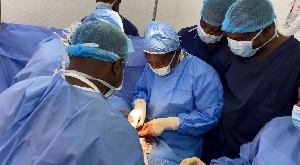Health News of Wednesday, 28 May 2025
Source: www.ghanawebbers.com
UNFPA embarks on free obstetric fistula surgeries for underprivileged women in five major hospitals
The United Nations Population Fund and local health authorities have started a new initiative. They are offering free obstetric fistula surgeries at five major hospitals in Ghana.
Over 200,000 women in Ghana suffer from obstetric fistula. This condition causes uncontrollable leakage of urine or feces due to a hole between the birth canal and bladder or rectum. The initiative, led by the Partnership to End Fistula in Ghana (PEFIC), aims to repair these cases. It will also provide support for survivors to help them reclaim their lives.
Ghana sees over 800,000 births each year. Unfortunately, many women experience complications during childbirth that lead to obstetric fistula. Victims report physical trauma and social isolation due to this condition. Prolonged labor can leave mothers incontinent, with some even losing their babies.
Sumaya Abdul Rahim, 29, shared her story: “I didn’t have complications after giving birth. But after a month, I started excreting and urinating uncontrollably. I haven’t gone out for a year because of the shame.”
Vida Opoku, a 33-year-old mother of five, said: “I can’t even go to church. I feel isolated from people. I use pampers and fear staining myself anywhere.”
To help these women regain normalcy, the UNFPA and health authorities are providing services at five hospitals: Komfo Anokye Teaching Hospital (Kumasi), Ho Teaching Hospital (Volta Region), Tamale West Hospital (Northern Region), Mercy Women Catholic Hospital (Central Region), and Upper West Regional Hospital.
This effort is part of UNFPA's goal to eliminate obstetric fistula in Ghana by 2030.
Dela Bright Gle, Programme Specialist at UNFPA, explained that this initiative addresses untreated cases and raises awareness about this life-threatening condition. She emphasized the importance of confronting stigma faced by survivors.
“There is an urgent need for public awareness on obstetric fistula,” she said. “Women should not suffer due to misconceptions about this treatable condition.”
During an event at Komfo Anokye Teaching Hospital on International Day to End Obstetric Fistula, 50 women were screened for treatment.
The free surgeries typically cost around $700 per patient. This includes transportation, surgery, and two weeks of recovery care.
Dr. Baffour Opoku, an Obstetric Fistula Surgeon at KATH, noted that quality care can treat this condition effectively. He stated that while fewer new cases arise now due to increased antenatal visits, more work remains.
“The first repair is always the best repair,” he added. “We hope to operate on all patients here by the end of this period.”
Victims expressed gratitude for the timely intervention they received.
“God thank UNFPA for this intervention,” Sumaya Abdul said. “It will bring me back to my old life.”
“I believe that after surgery I will be my normal self again,” Vida Opoku shared gratefully. “I am thankful for this opportunity.”











